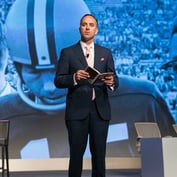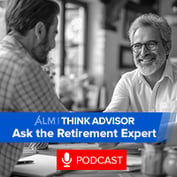Eric Scott, for lack of a better word, is a storyteller. He weaves pages from history, insights from his 30 years as a retirement expert, even touchstones from his personal life, to better connect with his clients, providing guideposts for their retirement.
When Scott’s Dad died earlier this year he spoke about it on his weekly radio show.
“My family called me from the hospital and told me Dad didn’t have long,” says Scott. “I knew as I was driving, trying to get to him, that our lives would be different.”
Scott’s family comes from a strong patriarchal and matriarchal line, he says, and, as the oldest son, he knew he was the next person in charge. He drove to the hospital with that information weighing on him, knowing that at 58, he would finally be the man of the family.
“I didn’t make it,” Scott says. “Dad was gone when I got there. When I walked in the hospital room, everyone looked at me and I could see it on their faces, ‘The relief. He’s here.’”
As painful as it was, Scott shared that story with his radio audience to let them know, “We all face crossroads in our lives. I wanted them to understand the emotional impact of losing someone, but then I wanted them to understand the financial impact as well.”
He asked questions of his audience. “Are you set up financially in the case of a death in the family? Have you done everything you should do with the estate? I told them Dad did some good things in his estate and did other things that created problems. I said this so they would understand the importance of planning.”
Scott uses stories as an educational tool and to make an emotional impact with his clients. When he first started doing radio, Scott hired a coach to critique him. The coach told him, “Eric, I love those stories you tell the listeners. They have a great emotional impact, but you wait too long to work them in. Begin your show with them.”
Scott listened to the advice and saw the difference in the leads his show generated.
“The stories hooked them,” Scott says. “The stories compelled them to listen to the entire show and hearing about real life experiences helped the content make more sense when we spoke about estate planning or taxes.”
A family thing
Nazi forces invaded Norway on April 9, 1940, and would occupy the neutral Scandinavian country until May, 8 1945, or V-E Day — the day marking Germany’s unconditional surrender of its armed forces in Europe. Many in Europe celebrated, others were torn; they rejoiced in the victory and the end of tyranny, but mourned the loss of loved ones.
Between the World Wars, Scott’s maternal grandfather had sailed to America. A single man from a small country, his eyes opened to the promise of the New World — a place where any man, even an immigrant, could rise above his lot if he were willing to work for it.
He returned to Norway and found a wife and would tell her — and later their children — of the New World, its vastness, its potential, but mostly he told of its freedom.
After the Nazis occupied Norway, he vanished one day, along with any details of his disappearance. That happened a lot in those terrible days: there; gone; the not knowing making it all that much worse.
The family didn’t forget. They remembered the man. They remembered the gleam in his eye when he spoke of the New World. Scott has a picture from 1951 of his mom and her sister, the girls wrapped in Red Cross blankets, as they disembark from their boat to America.
“Mom is so proud of her heritage. When my brother and sister and I were kids, Mom told us these stories of her family and her childhood so we could make that connection of who she was and where she came from,” Scott says.
“Dad would tell stories, too, really funny ones, and my Mom would say, ‘I don’t think you should be telling these stories until they get to adulthood.’”
Scott’s dad grew up in Virginia and his family line can be traced back to the Civil War and generations of men fighting in subsequent wars. His dad would take up the cause himself by serving in the Air Force during The Korean War. Eventually, he would side with Scott’s mom, telling the children, “Maybe you shouldn’t know all the things I did.”
He did tell them something that Scott has carried into his advisory practice: “Your word is your bond.”
 Celtic pride
Celtic pride
Scott’s mom and dad met in San Francisco and the family would move to Virginia, then back to California, before finally settling in Massachusetts for Scott’s high school years. It was there he began his fanatic passion for the Boston Celtics. A framed, autographed jersey of Larry Bird hangs on one wall of Scott’s office, along with other Celtic memorabilia. His favorite Bird story happened on March 12, 1985, when Bird torched the Atlanta Hawks for 60 points. Much like Babe Ruth calling his famed home run, Bird told teammate Kevin McHale, who had set the single-game scoring record just nine days earlier, “Don’t expect that record to last too long. I’m going to break it.”
Scott’s favorite Celtic moment occurred on June, 4, 1976, in Game 5 of the NBA Finals between the Celtics and the Phoenix Suns. Many NBA fans and historians consider it the greatest game ever played, a triple-overtime thriller at the Boston Garden.
“I was there,” Scott says. “I was on the last row, but I was there.”
“I’ve seen grainy replays of the game on The NBA Channel and the atmosphere looks like a sauna,” I tell him.
“It was hot in there,” says Scott, “but maybe not that hot. I will tell you, though, something the cameras didn’t pick up. In the third overtime, almost everyone had fouled out. Coach Tommy Heinsohn walked to the end of the bench. There were two guys there who never played. He closed his eyes and pointed at one of them.”








 August 20, 2015 at 07:26 AM
August 20, 2015 at 07:26 AM









